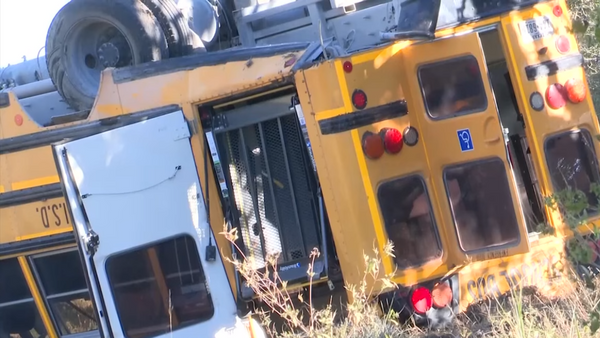
The US federal government shutdown was poised to move into record-breaking territory on Tuesday after the Senate rejected for the 14th time a funding package already passed by the Republican-controlled House of Representatives.
With the shutdown now in its record-equalling 35th day, frantic behind-the-scenes talks were under way to bring the standoff to a close amid expressions of alarm from Democrats and Republicans alike about its disruptive effects on millions of Americans.
The shutdown threatened services such as the federal food stamps program and has seen employees furloughed or working unpaid. It will exceed the 35-day closure that occurred during Donald Trump’s first presidency, in 2018, if it continues past midnight tonight.
With concerns over its impact mounting, the Trump administration moved on Monday to provide emergency funds that would keep the Supplemental Nutrition Assistance Program (Snap) operating at 50% capacity following court rulings stating that it could not legally withhold financial backing. The program provides food aid to 42 million Americans and costs around $9bn a month.
But Trump, who has hitherto made little effort to end the impasse, reopened the fears over Snap on Tuesday, by threatening to hold the program hostage until Democrats capitulate and vote in favour of the government funding package.
He wrote on social media that Snap benefits “will be given only when the Radical Left Democrats open up government, which they can easily do, and not before!”
While the Republicans hold a 53-47 majority in the Senate, Democrats are able to block the bill’s passage thanks to the filibuster, which needs the votes of 60 senators for passage. Trump has urged Republicans to use their majority to scrap the filibuster.
The president’s latest threat over Snap seemed to be a sign of growing edginess over a shutdown that he has sought to blame on Democrats but which polls indicate a majority of the public believe is the responsibility of the Republicans and his administration.
Unlike the earlier shutdown during his first term, when he fought Congress in 2018-19 for funds to build the US-Mexico border wall, the president has been largely absent from this shutdown debate.
Republican and Democratic senators are quietly negotiating the terms of an emerging deal. With a nod from their leadership, the senators are seeking a way to reopen the government, put the normal federal funding process back on track and devise a resolution to the crisis of expiring health insurance subsidies that are spiking premium costs across the country.
“Enough is enough,” said John Thune, the Senate majority leader and a South Dakota Republican, as he opened the deadlocked chamber.
Labour unions have stepped up pressure on lawmakers to reopen the government.
“We’re not asking for anything radical,” the Senate minority leader, Chuck Schumer, a Democrat, said. “Lowering people’s healthcare costs is the definition of common sense.”
With the House speaker, Mike Johnson, having sent lawmakers home in September, most attention is on the Senate, where party leaders have outsourced negotiations to a loose group of centrist dealmakers from both parties.
Central to any solution will be a series of agreements that would need to be upheld not only by the Senate, but also the House and the White House.
Senators from both parties, particularly the powerful members of the appropriations committee, are pushing to ensure the normal government funding process can be put back on track.
“The pace of talks have increased,” said Gary Peters, a Democratic senator from Michigan.
A substantial number of senators also want some resolution to the standoff over Affordable Care Act subsidies that are set to expire at year’s end.
However, the White House is demanding that Democrats vote to fund the government before talks over healthcare can begin. White House officials are said to be in close contact with GOP senators who have been quietly speaking with key Senate Democrats.
The loss of federal subsidies, which come in the form of tax credits, are expected to leave many people unable to buy health insurance.
Republicans, with control of the House and Senate, are reluctant to fund the healthcare program, also known as Obamacare. However, Thune has promised Democrats a vote on their preferred proposal, on a future date, as part of any deal to reopen government.
That’s not enough for some senators, who see the healthcare deadlock as part of their broader concerns with Trump’s direction for the country.
Democrats, and some Republicans, are also pushing for guardrails to prevent the Trump administration’s practice of unilaterally slashing funds for programs that Congress had already approved, by law, the way billionaire Elon Musk did earlier this year at the “department of government efficiency”.







